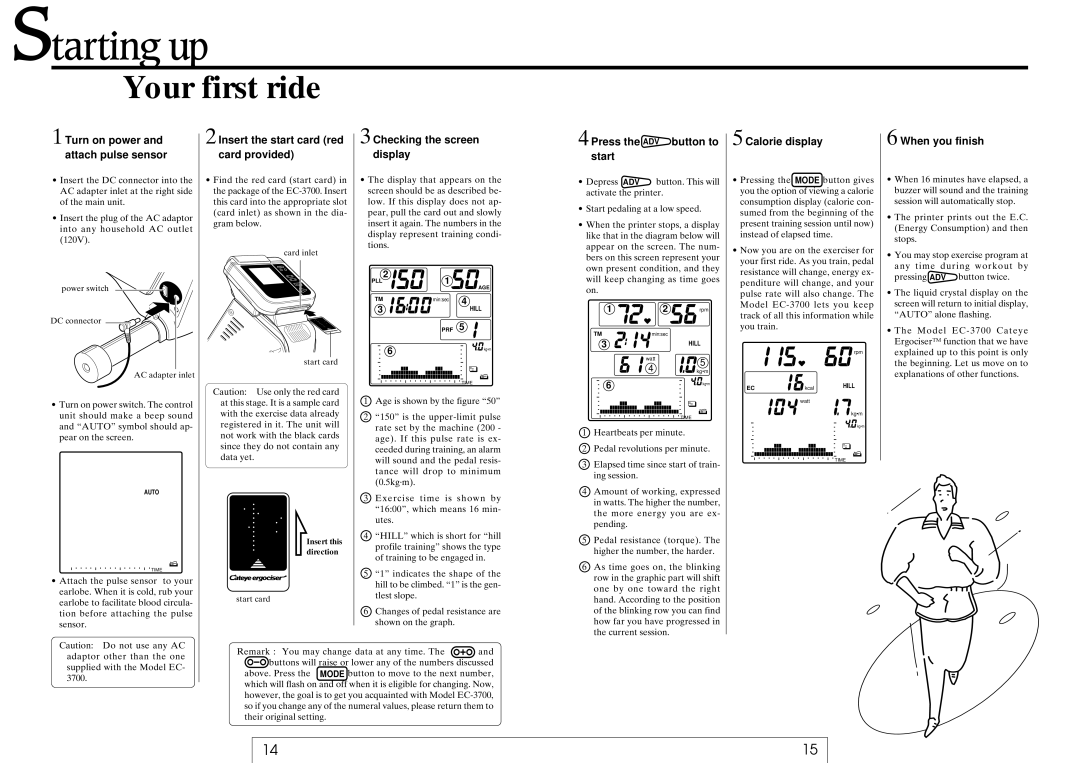
Your first ride
1Turn on power and attach pulse sensor
•Insert the DC connector into the AC adapter inlet at the right side of the main unit.
•Insert the plug of the AC adaptor into any household AC outlet (120V).
power switch
DC connector
AC adapter inlet
•Turn on power switch. The control unit should make a beep sound and “AUTO” symbol should ap- pear on the screen.
AUTO
TIME
• Attach the pulse sensor to your |
earlobe. When it is cold, rub your |
earlobe to facilitate blood circula- |
tion before attaching the pulse |
sensor. |
Caution: Do not use any AC |
2Insert the start card (red card provided)
•Find the red card (start card) in the package of the
card inlet
RESET
MODE
ADV
start card
Caution: Use only the red card at this stage. It is a sample card with the exercise data already registered in it. The unit will not work with the black cards since they do not contain any data yet.
Insert this direction
start card
3Checking the screen display
•The display that appears on the screen should be as described be- low. If this display does not ap- pear, pull the card out and slowly insert it again. The numbers in the display represent training condi- tions.
2 | 1 |
|
PLL | AGE | |
|
| |
TM | min:sec | 4 |
3 |
| |
| HILL |
| PRF 5 |
6 | kg•m |
| TIME |
1 Age is shown by the figure “50”
2“150” is the
3Exercise time is shown by “16:00”, which means 16 min- utes.
4“HILL” which is short for “hill profile training” shows the type of training to be engaged in.
5“1” indicates the shape of the hill to be climbed. “1” is the gen- tlest slope.
6Changes of pedal resistance are shown on the graph.
4Press the ADV button to start
• Depress ADV button. This will activate the printer.
•Start pedaling at a low speed.
•When the printer stops, a display like that in the diagram below will appear on the screen. The num- bers on this screen represent your own present condition, and they will keep changing as time goes on.
1 | 2 | rpm |
TM | min:sec |
|
3 |
| HILL |
| watt | 5 |
| 4 | |
| kg•m | |
6 |
| kg•m |
|
|
TIME
1 Heartbeats per minute.
2 Pedal revolutions per minute.
3Elapsed time since start of train- ing session.
4Amount of working, expressed in watts. The higher the number, the more energy you are ex- pending.
5Pedal resistance (torque). The higher the number, the harder.
6As time goes on, the blinking row in the graphic part will shift one by one toward the right hand. According to the position of the blinking row you can find how far you have progressed in the current session.
5Calorie display
•Pressing the MODE button gives you the option of viewing a calorie consumption display (calorie con- sumed from the beginning of the present training session until now) instead of elapsed time.
•Now you are on the exerciser for your first ride. As you train, pedal resistance will change, energy ex- penditure will change, and your pulse rate will also change. The Model
![]() rpm
rpm
EC | kcal | HILL |
![]() watt
watt
kg•m
![]()
![]() kg•m
kg•m
TIME
6When you finish
•When 16 minutes have elapsed, a buzzer will sound and the training session will automatically stop.
•The printer prints out the E.C. (Energy Consumption) and then stops.
•You may stop exercise program at any time during workout by
pressing ADV button twice.
•The liquid crystal display on the screen will return to initial display, “AUTO” alone flashing.
•The Model
adaptor other than the one |
supplied with the Model EC- |
3700. |
Remark : You may change data at any time. The ![]() and
and ![]() buttons will raise or lower any of the numbers discussed above. Press the MODE button to move to the next number, which will flash on and off when it is eligible for changing. Now, however, the goal is to get you acquainted with Model
buttons will raise or lower any of the numbers discussed above. Press the MODE button to move to the next number, which will flash on and off when it is eligible for changing. Now, however, the goal is to get you acquainted with Model
their original setting.
14 | 15 |
